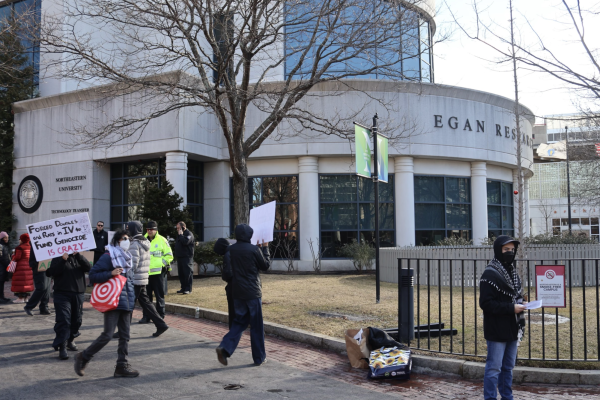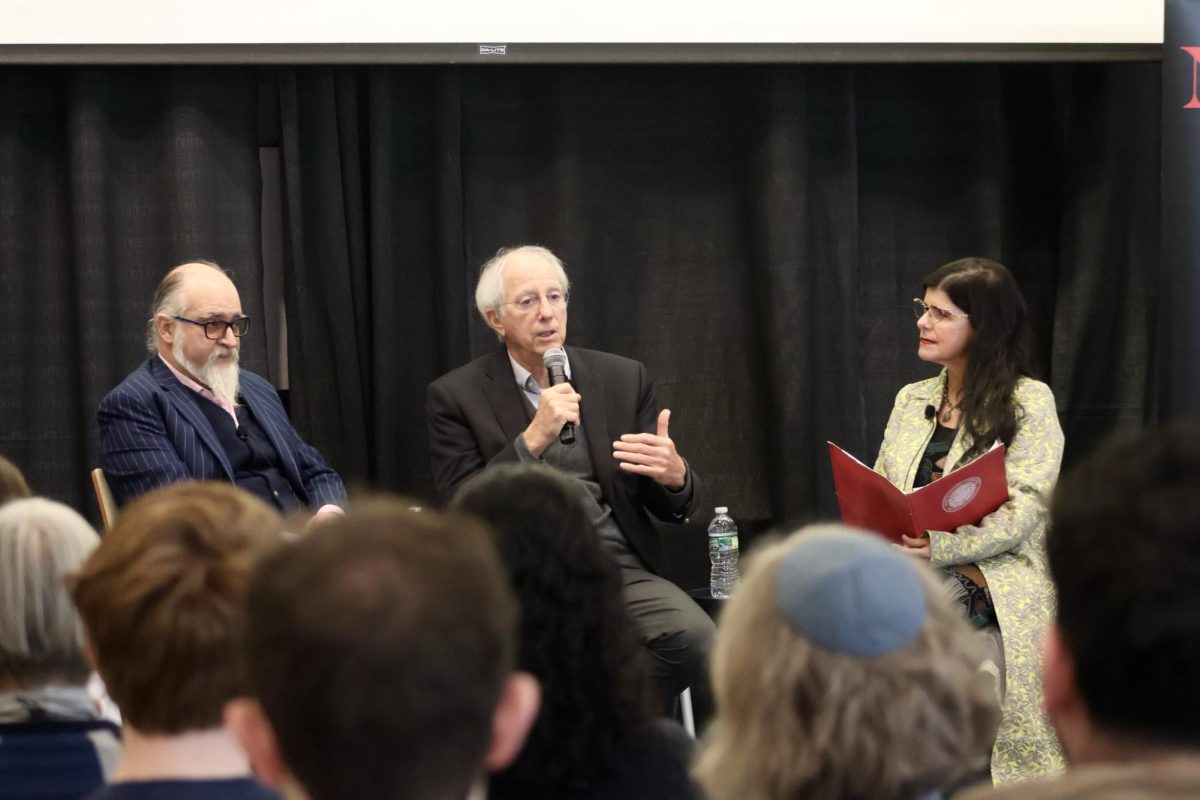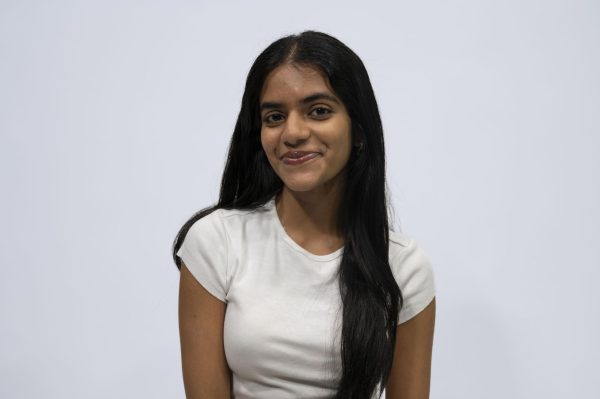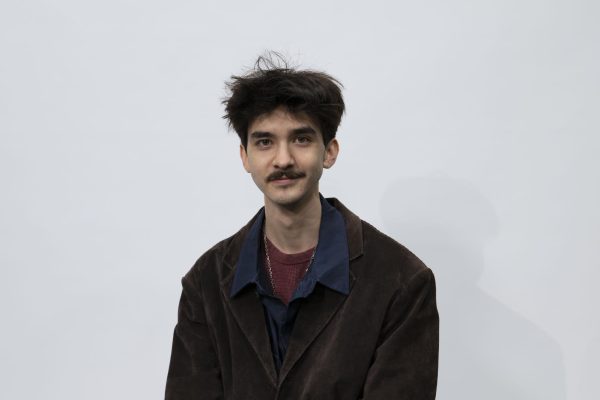More than 100 attendees filed into Egan Research Center for The Future of the Middle East Peace Process panel Feb. 4. The event, which comes as the Israeli government and Hamas continue to negotiate a deal for a ceasefire in Gaza, was marked by a small group of masked pro-Palestine activists who protested outside the event venue.
The panel is part of The Center for International Affairs and World Cultures’ Leaders in Foreign Service speaker series. Moderator and professor Denise Garcia of Political Science and International Affairs aimed to foster free inquiry and collaborative discourse on Middle East diplomacy. Garcia stressed the global nature of Northeastern’s network and the events put on through the speaker series as an opportunity to explore and understand the communities in which it finds itself.
The panelists included Ghaith al-Omari, a former executive adviser of the American Task Force on Palestine, and Dennis Ross, a former U.S. director of policy planning and a special Middle East coordinator. Garcia asked both panelists a series of questions about their experience in mediating and negotiating before allotted time for audience questions.
Throughout the panel, the audience could hear the faint sounds of megaphones and chants. Protesters just outside of the Egan Research Center were chanting a variety of slogans. “Exist! Resist! Return!” and “Forced Doubles and Rats in IV to Fund Genocide is Crazy” were etched onto posters that rose up and down along the loud yells aimed at Northeastern.

An Instagram story posted Feb. 4 by Huskies for Free Palestine encouraged students to protest the event. Before the event, the group of about 10 protesters gathered outside of Ruggles Station, surrounded by Northeastern University Police Department officers. The protesters declined to identify themselves when asked by The Huntington News.
After significant pro-Palestine protests during the 2023-24 academic year, Northeastern changed its Code of Student Conduct to reserve the right to delay students’ degrees if they are found to have violated university policy. Holding an on-campus demonstration without receiving university approval may be considered a violation.
Mary Ghawaly, a second-year economics and political science combined major, said the panel was an important way to “facilitate dialogue” and be able to have “an outside look on the conflict.”
“I am curious to hear the panelists’ thoughts on peace in the Middle East,” said Maya Galante, a fourth-year environmental science and international affairs combined major. “I’m looking forward to hear[ing] both sides.”
Speakers shared their personal connections with the Middle East. Ross said that as he learned more about the decades-long struggle between Israel and Palestine, he was inspired to take action, starting in the 1970s.
“This was a conflict where it wasn’t a morality play,” Ross said to the audience. “It wasn’t a case where one side was all right, the other was all right. Both sides lost from it.”
Over the years, Ross, who spent decades working specifically in U.S.-Israel relations, has met people from various nations in the Middle East and saw that almost everyone had lost a member of their family.
“When I was working on arms control issues, everything was an abstraction — the notion of balance or stability in arms control is based on theories,” Ross said. “This was not any longer an abstraction, real people paid the price for this [conflict].”
The two expressed that both sides of the conflict held strong emotional feelings about how peace should be constructed and that mediators in these contentious issues are critical.
“Anybody who’s actually ever been a mediator is never completely neutral,” Ross said. “And if you were completely neutral, you’ll give up in high-stakes conflicts because you’re going to fail a whole lot more than you’re going to succeed. You have to have an emotional commitment to what you’re doing.”
Ross touched upon the relationship between the U.S. and Israel. “Nobody has the influence on Israel like we do,” Ross said. “Will we always succeed? No. But is there anybody else who can move the Israelis? No. So you need the U.S. as a broker.”
After both panelists spoke, Garcia said, “Let’s admit the state of the world right now is not perfect; it’s a work in progress.” Both al-Omari and Ross laughed. Garcia then opened the floor to questions from audience members.
When asked what the panelists would say to those like the protesters outside, who believe more pressure needs to be put on Israel’s government, al-Omari pointed to the complexities of the conflict, which he said made that kind of discussion unproductive.
“When you come to someone and say, ‘you are purely evil, you were born a sin, you are such a horrible, horrible person, now let’s talk’ — you have already shut down the conversation.” al-Omari said. “It’s not a question of who you throw more responsibility on at the end of the day if you’re looking at it from a pluralist ideal — in the market of self-interest, all we can do is build constituencies with the other side, and you can only do that by accepting the basic validity that the other side has a different point of view.”
Another student asked about what a productive and effective dialogue about the conflict would look like, touching on some of the demonstrations occurring on college campuses across the country.
“I see a lot of people on the campus deciding they want to bring the conflict from the Middle East to the campus,” Ross said. “The one thing I know is, if you can’t talk to each other, you have no chance of being able to resolve [the conflict].”
Al-Omari compared and contrasted the current global political climate to the one he worked with during the 1990s.
“What is the hardest to explain to this generation is the fact that we had hope [back then],” al-Omari said. “In many ways, we thought that peace was so within reach that we aimed too high.”
Al-Omari and Ross explained that peace between the two nations seemed possible near the turn of the century; however, that goal is now likely further away.
Ross was a political appointee of two Republican presidents and two Democratic presidents, stretching from the Carter administration through the Clinton administration, something that he said makes him a “unique species.” Having experienced major political transitions, Ross is watching to see how President Donald Trump’s administration adjusts its policies toward the region.
“Coming in, administrations want to make their mark, they want to demonstrate it’s different,” Ross said. “As time goes on, you tend to move towards other positions that are more sustainable and that are least costly, and those in a lot of areas will not be that different from what proceeded. I hope that helps.”
Besides the need for leadership and its approach to change, the panelists emphasized that “bottom-up” collaboration is also essential to creating peace, especially on issues that “don’t respect borders,” including public-health and the environment. “Today’s Israelis and Palestinians can’t imagine they can cooperate on anything, and yet even today, there’s cooperation that gets no visibility,” Ross said. “Give it visibility, so both sides see it — we have to reestablish, literally, the idea that the two sides can cooperate.”
The two also hope that there will be greater opportunities for dialogue and emotional release for both Palestinians and Israelis to address the decades of trauma between the two countries.
“I would like to create a public forum where Israelis and Palestinians can come together, given real media exposure, where each side says to the other, ‘this is what I’m feeling and why I’m feeling it,’” Ross said. “Neither side has the ability to provide a release right now, and one of the things we have to work towards is such a release.”
Ross said what he doesn’t want people to do — especially in light of the administration change — is give up.
“It guarantees, it creates a self-fulfilling prophecy, that there is no hope, there is no possibility and you still have a reality,” Ross said. “Israelis are not going anyplace and Palestinians are not going anyplace.”
Al-Omari said they’ve never witnessed something like the past year in decades of studying the conflict.
“Palestinians and Israelis right now are not at the stage where they can start addressing the mutual trauma,” al-Omari said. “A big factor in the success or failure of these healing processes relates to leadership. I’m pessimistic because the leaders that I see today on both sides actually have an interest in their mindset or behavior, certainly deepens the sense of insecurity and trauma, so it requires major political change.”













